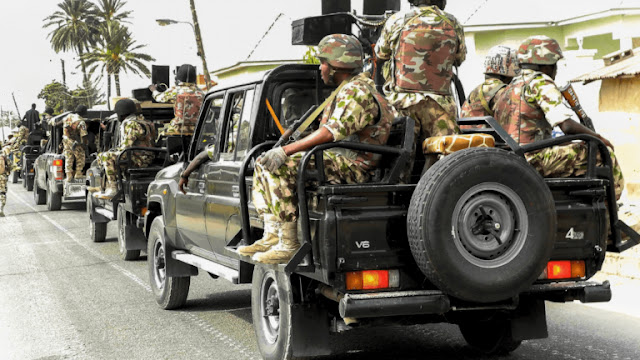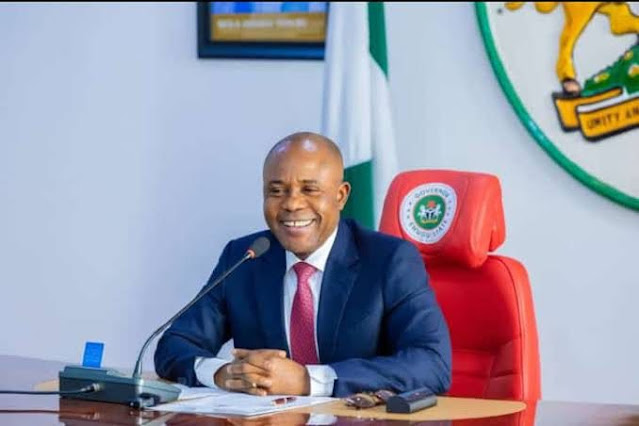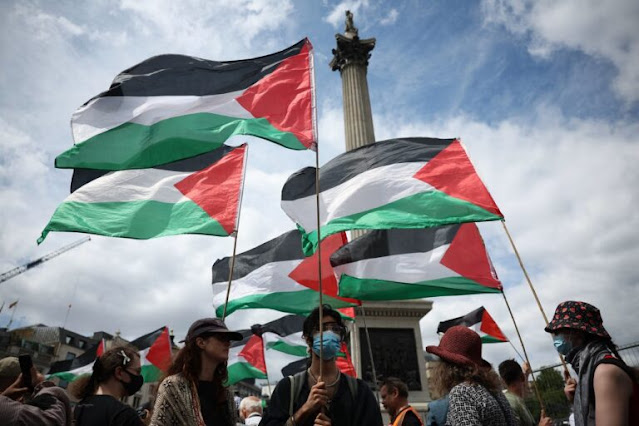In a significant development showcasing the vigilance of Nigeria’s security forces, the Nigerian Army has apprehended a 36-year-old man, Mr. Animashaun Khalid, for allegedly impersonating a military officer with the rank of Major. The suspect was subsequently handed over to the Lagos State Police Command for a comprehensive investigation, marking another instance of effective collaboration between the military and police in tackling criminal activities in the state. The arrest, which has sparked widespread attention, underscores the importance of inter-agency cooperation and public vigilance in maintaining law and order in Nigeria’s bustling commercial capital.
The arrest was confirmed by the Lagos State Police Command’s spokesperson, Mr. Benjamin Hundeyin, in a detailed statement released on Monday. According to Hundeyin, the suspect was apprehended by personnel of the 9 Brigade, Ikeja, at the bustling Arena Market in Oshodi, one of Lagos’ busiest commercial hubs. The soldiers, acting on intelligence or routine patrol, discovered that Mr. Khalid was in possession of a forged Nigerian Army identity card that falsely identified him as a Major. The counterfeit document, which bore his name and the fabricated rank, raised immediate suspicion, leading to his swift detention by the military personnel.
Following his arrest, Mr. Khalid was promptly transferred to the Lagos State Police Command headquarters in Ikeja, where the case was assigned to Special Squad I, a specialized unit tasked with handling complex and sensitive investigations. The police have launched a thorough probe to unravel the circumstances surrounding the suspect’s actions, with a particular focus on tracing the origin of the forged identity card, identifying any potential accomplices, and determining whether Mr. Khalid had leveraged his fake military rank to perpetrate other criminal activities. This multi-pronged investigation aims to uncover the full extent of the suspect’s operations and ensure that justice is served.
Details of the Arrest and Investigation
The incident unfolded in the heart of Oshodi, a vibrant and densely populated area known for its sprawling markets and heavy foot traffic. The Arena Market, where Mr. Khalid was apprehended, is a focal point for commerce, attracting traders, shoppers, and visitors from across Lagos and beyond. It was in this busy environment that the sharp-eyed soldiers of the 9 Brigade noticed something amiss about the suspect’s demeanor or documentation, prompting them to take action. The discovery of the forged identity card, which falsely portrayed Mr. Khalid as a high-ranking military officer, was a critical breakthrough that highlighted the audacity of his alleged impersonation.
The Nigerian Army’s swift response in apprehending the suspect demonstrates the military’s commitment to upholding its reputation and preventing individuals from exploiting its authority for illicit purposes. Impersonating a military officer is a serious offense under Nigerian law, as it undermines the credibility of the armed forces and can be used to facilitate a range of criminal activities, from fraud and extortion to more dangerous offenses. By handing Mr. Khalid over to the police, the Army ensured that the matter would be thoroughly investigated by the appropriate authorities, allowing for a coordinated approach to addressing the crime.
The Lagos State Police Command, upon receiving the suspect, wasted no time in initiating a detailed investigation. Special Squad I, known for its expertise in handling high-profile cases, has been tasked with delving into the intricacies of the case. According to police sources, the investigation will focus on several key areas. First, authorities aim to trace the origin of the forged identity card, which could provide critical clues about how such documents are produced and distributed. This aspect of the probe may uncover broader networks involved in the creation and sale of counterfeit identification, a growing concern in Nigeria’s security landscape.
Second, investigators are working to identify any accomplices who may have assisted Mr. Khalid in his alleged impersonation scheme. The possibility that the suspect was part of a larger criminal network cannot be ruled out, and the police are keen to determine whether others were complicit in his activities. Finally, the investigation will explore whether Mr. Khalid used his fake military rank to commit other crimes, such as defrauding unsuspecting victims, intimidating individuals, or gaining unauthorized access to restricted areas. The outcome of this probe will be crucial in determining the full scope of the suspect’s actions and ensuring that all related offenses are addressed.
Inter-Agency Cooperation and Public Safety
The arrest of Mr. Khalid has been hailed as a testament to the strong cooperation between the Nigerian Army and the Lagos State Police Command. Lagos State Commissioner of Police, Mr. Olohundare Jimoh, was quick to commend the Army for its vigilance and prompt action in apprehending the suspect. In his remarks, Mr. Jimoh emphasized the importance of collaboration among security agencies in combating crime and maintaining public safety. “The Nigerian Army’s swift intervention in this case is a clear example of the kind of synergy we need to tackle criminal activities effectively,” he said. “Their immediate handover of the suspect to the police has enabled us to take swift action and ensure that justice is pursued.”
Mr. Jimoh’s comments reflect a broader recognition of the need for seamless coordination between Nigeria’s security agencies, particularly in a city as dynamic and complex as Lagos. With a population of over 20 million and a reputation as Nigeria’s economic powerhouse, Lagos faces unique security challenges that require a unified approach. The collaboration between the Army and the police in this case serves as a model for how agencies can work together to address threats, share intelligence, and ensure that suspects are brought to justice.
The Commissioner also took the opportunity to call on residents of Lagos to play an active role in maintaining security in their communities. He urged citizens to remain vigilant and report any suspicious activities or individuals to the authorities promptly. “Public safety is a shared responsibility,” Mr. Jimoh noted. “We rely on the cooperation of residents to help us identify and address potential threats. By working together, we can create a safer environment for everyone in Lagos State.”
Broader Implications and Public Response
The arrest of Mr. Khalid has sparked discussions about the broader issue of impersonation and the misuse of official identities in Nigeria. The proliferation of forged documents, including military and police identification, poses a significant challenge to law enforcement and undermines public trust in institutions. Such cases can also have serious security implications, as individuals posing as authority figures may exploit their fake credentials to perpetrate crimes or gain access to sensitive information.
The incident has also highlighted the importance of public awareness and vigilance in combating such crimes. The Arena Market, where the suspect was apprehended, is a microcosm of Lagos’ diverse and fast-paced environment, where individuals from all walks of life interact daily. The fact that the soldiers were able to identify and detain Mr. Khalid in such a busy setting underscores the need for constant alertness among both security personnel and civilians. Community members have expressed appreciation for the Army’s quick response, with many calling for increased patrols and checks in public spaces to prevent similar incidents.
### Looking Ahead: Strengthening Security Measures
As the investigation into Mr. Khalid’s case progresses, the Lagos State Police Command has assured the public that it will leave no stone unturned in its efforts to uncover the truth. The police have pledged to work closely with the Nigerian Army and other relevant agencies to ensure that all aspects of the case are thoroughly examined. The outcome of the investigation is expected to shed light on the methods used by individuals like Mr. Khalid to obtain and use forged documents, potentially leading to measures to prevent such activities in the future.
The case also serves as a reminder of the importance of safeguarding the integrity of official identification systems. The Nigerian Army and other institutions may need to review and strengthen their processes for issuing and verifying identity cards to prevent counterfeiting. Additionally, public education campaigns could help raise awareness about the dangers of impersonation and encourage citizens to report suspicious behavior.
For now, the collaboration between the Nigerian Army and the Lagos State Police Command stands as a shining example of how security agencies can work together to protect the public. The arrest of Mr. Animashaun Khalid is a step toward ensuring that those who attempt to exploit the authority of Nigeria’s armed forces are held accountable. As the investigation unfolds, the people of Lagos and beyond will be watching closely, hopeful that justice will be served and that measures will be put in place to prevent similar incidents in the future.
In conclusion, the apprehension of Mr. Khalid is more than just a single arrest—it is a powerful reminder of the importance of vigilance, cooperation, and community engagement in the fight against crime. The Nigerian Army’s swift action, combined with the police’s commitment to a thorough investigation, sends a strong message that impersonation and other criminal activities will not be tolerated. As Lagos continues to grow and evolve, such efforts will be critical in maintaining the safety and security of its residents.






